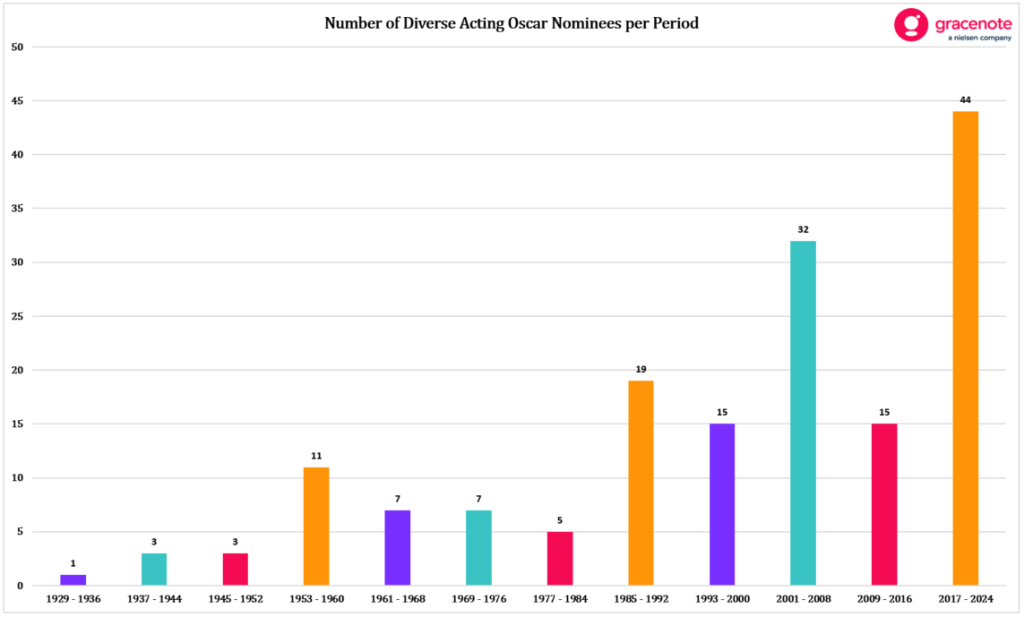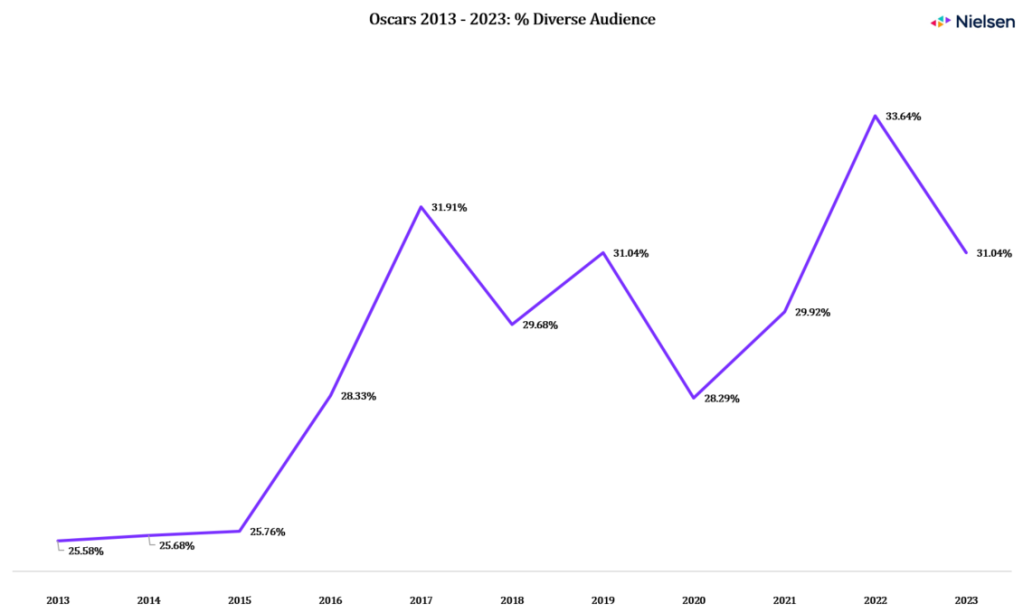In 2015, none of the 20 acting nominations at the Academy Awards went to diverse talent for the first time since 1998. One year later, the same thing happened, marking the first time since the six successive years between 1975 and 1981 that no person of color received a nomination in one of the Academy’s acting categories for two consecutive years. Since those two blank years, the number of diverse nominees has nearly tripled in the acting categories compared to the eight years before 2017 according to new research on diversity at the Oscars by Nielsen’s Gracenote.
The Inclusion Analytics and Studio System teams at Gracenote compared the Oscar nominations in the eight years from 2017 to 2024 with those from 2009 to 2016. In addition, the team looked at the full history of Academy Award wins and nominations for diverse talent.
- There have been nearly three times as many acting nominations for diverse actors in the last eight years of the Oscars than there were for the eight years before 2017.
- From 2017 to 2024, 44 acting nominations have been diverse with 11 of those nominees going on to win. One or two more Oscar wins for diverse actors can be expected at this year’s show.
- In the eight years before 2017, 14 diverse actors received 15 Oscar nominations in the acting categories. Viola Davis was nominated twice. Only Octavia Spencer (The Help) and Lupita Nyong’o (12 Years A Slave) were diverse winners during this period.
- There were less than half the number of diverse Oscar nominees from 2009 to 2016 than in the previous eight years, from 2001 to 2008, when 26 different diverse actors received 32 nominations and won eight Oscars.
- This year, three of the five best supporting actress nominees are diverse women – America Ferrera (Barbie), Danielle Brooks (The Color Purple) and Da’Vine Joy Randolph (The Holdovers).
- This is the seventh time in Oscars history that three nominees in an acting category have been diverse after 2004 (best supporting actor), 2007 (best supporting actress), 2017 (best supporting actress), 2021 (best actor AND best supporting actor) and 2023 (best supporting actress).
- With Da’Vine Joy Randolph looking likely to win best supporting actress at this year’s Academy awards after her successes at other awards shows, 2024 should be the fourth successive year with a diverse winner of an acting Oscar. This will extend an unprecedented streak of success for diverse actors at the Oscars.
- Success for Randolph would also mean acting wins for diverse talent at six of the last eight years of the Oscars. This would also be unprecedented.
- This year seven diverse actors have been nominated for Oscars. This is the fifth year with at least seven diverse nominees in the acting categories, with only one of those years (2007) occurring before the last eight years.
- This year marks the third year in the last four with at least seven diverse acting nominees. The record is nine in 2021.

The increase in diverse acting nominees appears to have increased the interest in the Oscars show amongst diverse audiences.
- Nielsen audience measurement data shows that more than 30% of viewers of the Oscars have been non-white for four of the last five shows. From 2013 to 2015, 25.5% to 26% of viewers were diverse.
- Last year, when Michelle Yeoh won Best Actress and Ke Huy Quan won best supporting actor, over 8% of the audience were Asian, the highest percentage in the last 11 years.
- One year earlier, when Will Smith and Denzel Washington were both nominated for best actor (and Smith won), 14.2% of the audience was Black compared to 8.5% to 9% from 2013 to 2016.
- In 2019, 12.7% of the audience was Hispanic, the highest proportion of viewers from this group between 2013 and 2023. That year, Mexican/U.S. co-production Roma was nominated for 10 Academy Awards, including best picture, best actress and best supporting actress, sharing the accolade of most nominated film with The Favourite.
- The total audience increased by 11% between 2018 and 2019 but the Hispanic audience grew by 29%.
- The 2020 awards show saw the lowest audience share of diverse audiences (including Hispanic/LatinX, Black, Asian or other ethnic/racial groups) of 28.3% since 2015. That year, only one diverse actor was nominated.
- The highest interest was for the 2022 awards show when 33.6% of the audience was diverse according to Nielsen data.
- Although the proportion of the audience represented by Black, Hispanic/LatinX, Asian and Pacific Islander viewers declined last year, the number of people from these groups watching has grown in the last two years, from 3.03 million to 5.6 million, an increase of 85%.
- The number of Hispanic viewers has grown more than any other market segment since 2021, increasing by 95%.

About Gracenote
Gracenote is the content solutions business unit of Nielsen providing entertainment metadata, content IDs and related offerings to the world’s leading creators, distributors and platforms. Gracenote technology enables advanced content navigation and discovery capabilities ensuring consumers can easily connect to the music, TV shows, movies and sports they love while delivering powerful content analytics making complex business decisions simpler.
About Nielsen
Nielsen shapes the world’s media and content as a global leader in audience measurement, data and analytics. Through our understanding of people and their behaviors across all channels and platforms, we empower our clients with independent and actionable intelligence so they can connect and engage with their audiences—now and into the future. Nielsen operates around the world in more than 55 countries. Learn more at www.nielsen.com and connect with us on social media (Twitter, LinkedIn, Facebook and Instagram).
Media Contact
Patricia Ratulangi
patricia.ratulangi@nielsen.com
